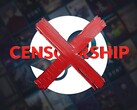In the US, Mark Zuckerberg plans to work with President-elect Donald Trump to fight against censorship and hopes to take this fight all over the world, including the European Union. However, a European Commission spokesperson recently contradicted his claims that the Digital Services Act forces the removal of lawful content.
According to Reuters, Zuckerberg recently said that
"Europe has an ever increasing number of laws institutionalizing censorship and making it difficult to build anything innovative there,"
and the brief answer provided was,
"We absolutely refute any claims of censorship."
Expanding on this brief response, the EU representative stated that they are merely assessing the efficacy of content moderation measures and policies that global social media companies have adopted and implemented locally. However, relying solely on "community notes" could result in situations akin to the recent cancelled presidential elections in Romania due to alleged foreign meddling.
The fact that pro-Georgescu channels alongside seemingly innocent AI-driven accounts continue to spam Romanians on Facebook even now shows that there's a very thin line between lawful and illegal content, and external fact-checking organizations should be kept in the loop. In the end, it should always be about one's freedom of choice.
Speaking of freedom, those interested in what happened with Europe in 1989, including Romania, should check out The 1989 Revolutions in Central and Eastern Europe: From Communism to Pluralism. This book is available in Kindle, hardcover, and paperback formats, starting at $21.58.



























